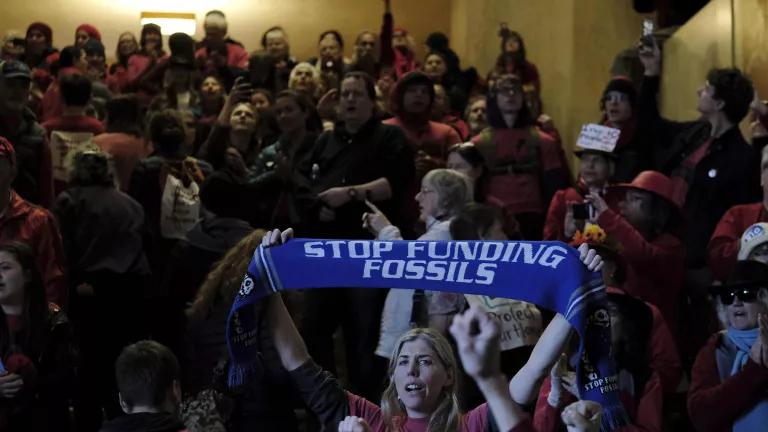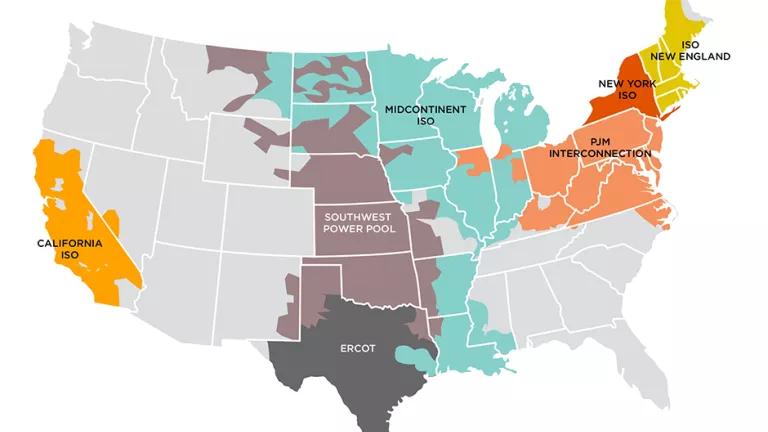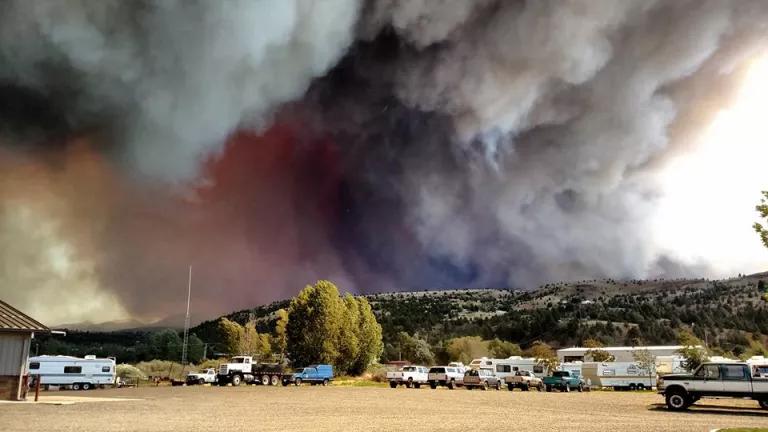NRDC Sues FERC over Unlawful Jordan Cove LNG Project
The liquefied natural gas terminal in Oregon is massively misguided, destructive, and politically driven—so we’re fighting to stop it.

Protesters rally at the state capitol in Salem, Oregon, against Jordan Cove's planned construction of a Liquefied Natural Gas (LNG) export terminal.
Alex Milan Tracy/Sipa via Associated Press
This blog was authored by NRDC fellow Alison Gocke, who has worked with Ann and Gillian on the Jordan Cove Energy Project.
NRDC filed suit against the Federal Energy Regulatory Commission (FERC) today, challenging its decision to green-light the Jordan Cove energy project in Oregon, a massive—and massively misguided—multibillion-dollar plan for a liquefied natural gas (LNG) terminal on the Oregon coast and an associated pipeline. NRDC alerted FERC to numerous issues with the project in July 2019, and again in April 2020, but got ignored. Now, we’re taking the fight to the D.C. Circuit.
In a world of terrible fossil fuel projects—which is, unfortunately, what we live in right now—Jordan Cove hits the trifecta: destructive, not needed, and politically driven. FERC even rejected this same project four years ago, precisely because there was no evidence that the project was needed. But four years and a political sea change later, FERC has reversed itself.
As one might expect, Jordan Cove is a veritable steamroller of serious adverse impacts. FERC acknowledges that the project will—at a minimum—release more than 2 million tons of global warming–inducing greenhouse gas emissions per year. And that’s not even counting the upstream greenhouse gas emissions that would result from producing the gas for export or the downstream emissions that would result from burning that gas for consumption, since FERC takes the irrational position that it doesn’t even have to consider those emissions as part of its analysis. Jordan Cove will also be built near Native American tribal lands and cultural resources and low-income communities, and the anticipated increase in shipping associated with the project poses serious risks to local wildlife, including the Southern Resident orca and the California gray whale—two of the most iconic wildlife species on the planet. The law requires FERC to take a hard look at all of these serious impacts, but what we got instead was a glib dismissal.
And here’s the real kicker: In its enthusiasm to approve Jordan Cove, FERC dances relentlessly around the fact that nobody but the project developers actually wants this project to be built. There is a very real chance that, in view of the economics of gas and the litany of risks associated with this project, in particular, the whole thing will end up being a project in name only or, even worse, it will be built and almost immediately become a stranded asset.
When FERC denied Jordan Cove four years ago, it rightly found that the developers had failed to show that the pipeline that would serve the LNG terminal was necessary—a requirement under the Natural Gas Act. This time around, however, FERC reversed itself based on an agreement that the pipeline developer had signed with the LNG terminal developer, even though the pipeline developer and the LNG terminal developer are corporate affiliates of the same company. In other words, the project developers signed a contract with themselves to demonstrate the pipeline’s need.
In a sharply worded dissent, FERC commissioner Richard Glick recognized the deeply incestuous nature of this purported assurance of necessity, noting that a purchase agreement between two affiliates of the same parent company might not exactly be what one would call an arm’s-length transaction. The dissent also noted that the ongoing global downturn in the gas market makes it even more speculative that Jordan Cove will ever be built. This is problematic because FERC’s approval of the pipeline brings with it the power for the pipeline developer to take land by eminent domain—immediately. As Glick pointed out, “it would be unconscionable for this commission to permit a developer to seize private land for a project that has little chance of ever being completed”—and yet that is exactly what FERC did.
In defense of its decision, FERC threw in some hand-waving arguments about Jordan Cove benefiting the local economy, but Oregon doesn’t see it that way. Pembina, the corporate parent of both the pipeline and LNG terminal developers, is a Canadian company proposing to take gas from Canada and export it overseas via Jordan Cove. Thus, even if the project is built, it likely will simply use the United States as the highway from which to ship Canadian gas to foreign customers. Oregon and its beautiful,biologically diverse coast are simply the screen door that the developer will slam through when transporting polluting fossil fuel energy from one foreign country to another. Oregon has denied the project’s developers permits under the Clean Water Act and Coastal Zone Management Act precisely because of the threat Jordan Cove poses to Oregon’s waterways and coastal areas.
Glick summed up the sorry situation in his dissent: “Rather than wrestling with the project’s significant adverse impacts, today’s order makes clear that the commission will not allow these impacts to get in the way of its outcome-oriented desire to approve the project.”
But if FERC won’t get in the way, NRDC’s lawyers will.




